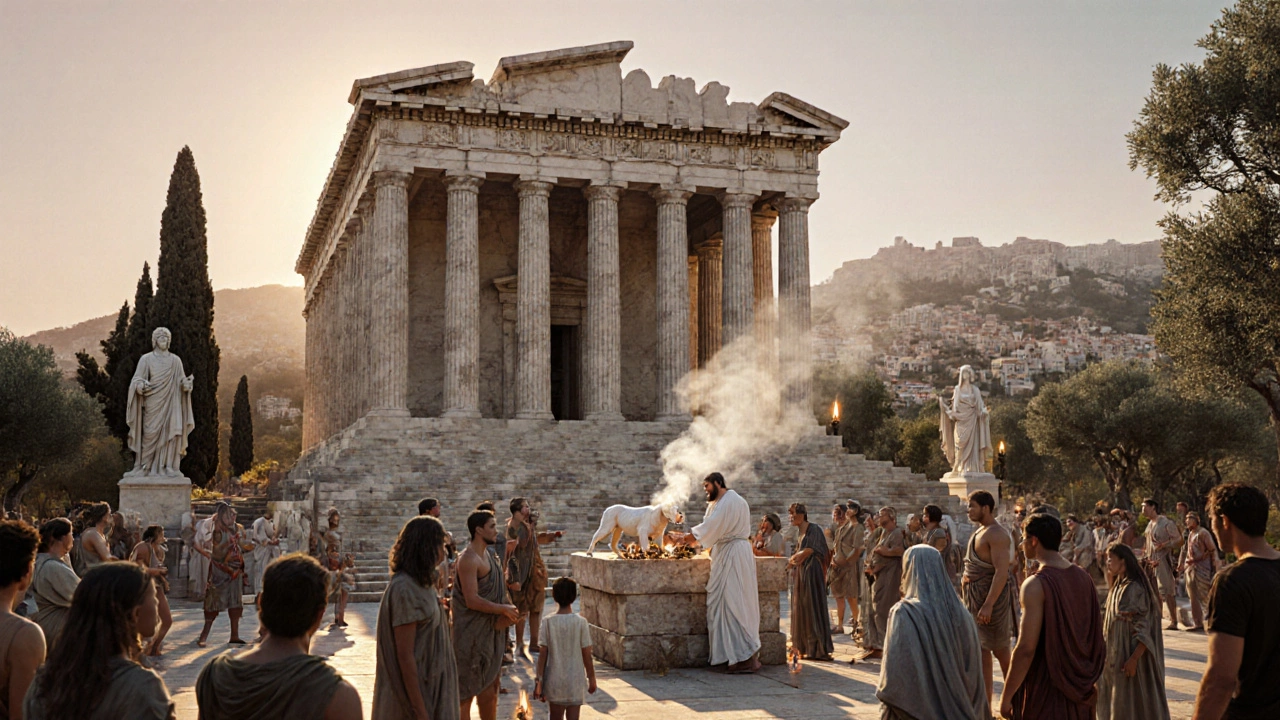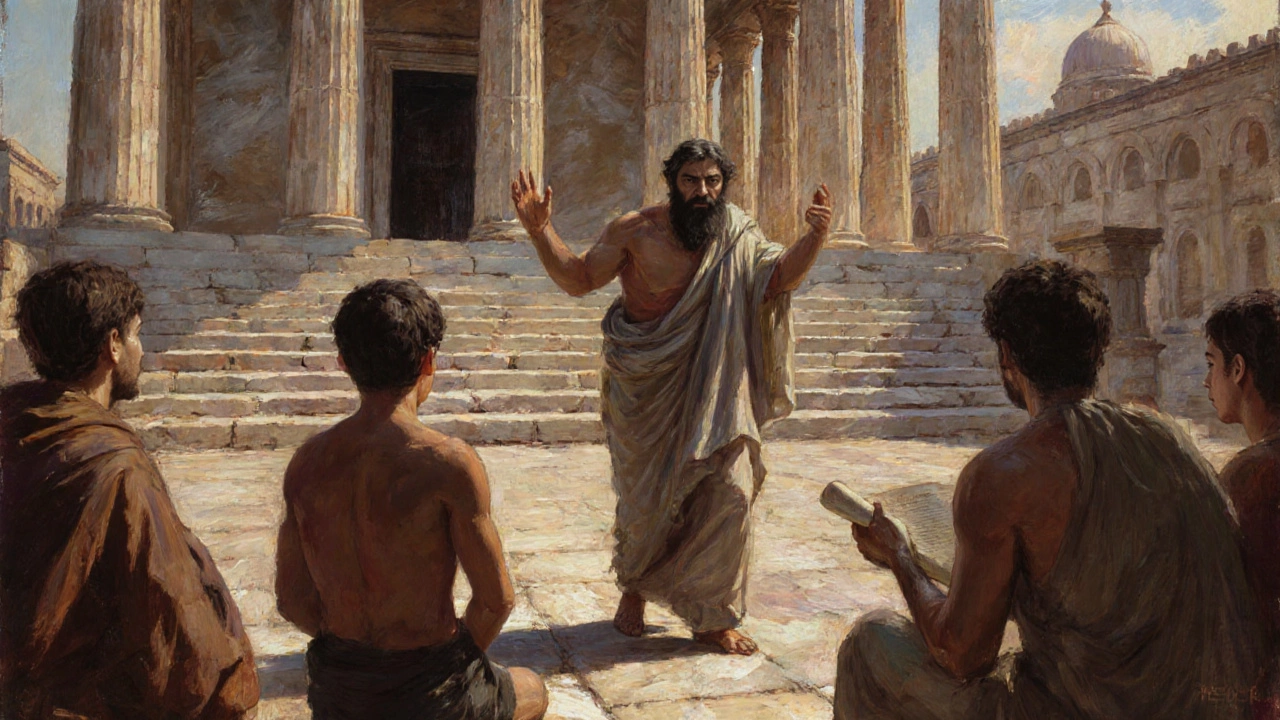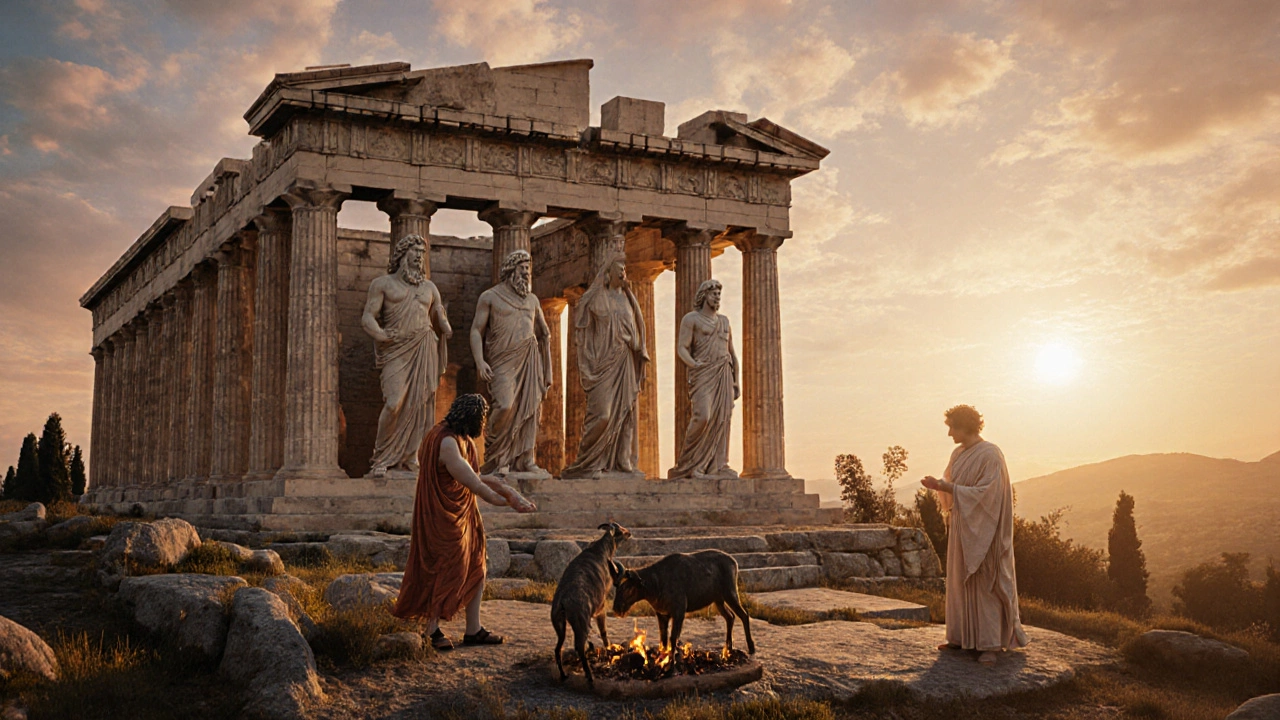Why People Stopped Believing in Greek Gods - Historical Reasons Explained
 Oct, 22 2025
Oct, 22 2025
Key Takeaways
- Greek religious belief eroded as rational philosophy questioned mythic explanations.
- Political upheavals and the Macedonian-Roman conquests weakened traditional worship.
- The spread of Christianity offered a unified monotheistic alternative that appealed to urban populations.
- Cultural syncretism blended Greek deities with Roman and Eastern gods, diluting pure Hellenic practice.
- Even after worship faded, Greek gods survived in art, literature, and modern pop culture.
When the ancient Greeks first gathered on the slopes of Greek gods the pantheon of deities worshiped across the Greek world, they weren't just naming gods; they were anchoring every facet of daily life to a divine order. Yet, by the end of antiquity, the belief in Greek gods had largely disappeared. Why did this shift happen? Below is a step‑by‑step look at the cultural, philosophical, and political forces that led the ancient world away from its beloved Olympians.
1. The Foundations of Greek Religious Practice
In Ancient Greece the city‑state civilization flourishing from the 8th to 4th centuries BCE, religion was woven into public and private rituals. Temples, festivals like the Dionysia, and oracular sites such as Delphi were civic responsibilities, not optional hobbies. Sacrifices to Zeus king of the Olympian pantheon, *Athena* the goddess of wisdom, and *Apollo* of light reinforced social cohesion.
But unlike monotheistic traditions, Greek worship was decentralized. Each polis chose its patron deities, leading to a fluid network of belief rather than a single, dogmatic creed. This flexibility made the system adaptable-yet also vulnerable to change.
2. The Rise of Rational Philosophy
By the 5th century BCE, thinkers began asking “why” instead of merely “how.” Socrates the classical Athenian philosopher famous for the Socratic method challenged citizens to examine moral concepts without invoking divine authority. His student, Plato philosopher who founded the Academy and wrote dialogues featuring Socrates, introduced the Theory of Forms, suggesting that the material world-including the stories of gods-was a mere shadow of a higher reality.
Later, Aristotle philosopher who systematized logic and natural science pursued empirical explanations for phenomena traditionally attributed to the gods-like earthquakes (attributed to Poseidon). As scientific inquiry grew, mythic causality lost its explanatory power.
The philosophical shift didn’t instantly replace belief, but it created an intellectual undercurrent that questioned the literal existence of deities.

3. Political Turbulence and the Macedonian-Roman Conquests
Alexander the Great’s empire (336-323 BCE) spread Greek culture across the Near East, but also began blending local deities with the Olympian roster. In Egypt, *Serapis* emerged-a hybrid of *Osiris* and *Zeus*-illustrating how political ambition could reshape divine identities.
When Rome absorbed Greece in the 2nd century BCE, the Greeks found themselves under a new administrative system. The Romans were eclectic worshippers; they equated *Jupiter* with *Zeus* and *Mars* with *Ares*. While this syncretism allowed Greek gods to persist under Roman names, it also diluted pure Hellenic worship. The Roman state emphasized loyalty to the emperor and the imperial cult, shifting public focus from local gods to the ruler’s divine authority.
Furthermore, Roman law increasingly regulated religious practice, limiting the political power of priestly classes that had once championed traditional rites.
4. Christianity’s Ascendance as a Unifying Faith
By the 1st century CE, Christianity began as a small Jewish sect but quickly appealed to urban, lower‑class, and women-demographics often marginalized in the pagan world. Its promise of salvation, personal relationship with a single God, and moral framework resonated where polytheistic rituals felt fragmented.
The pivotal moment arrived with Emperor Constantine’s Edict of Milan (313 CE), legalizing Christianity, and later Theodosius I’s decree (380 CE) making it the state religion. This top‑down endorsement forced pagan temples to close, confiscated their wealth, and redirected public funds to churches.
Christian writers like St. Augustine early Christian theologian who argued against paganism in "City of God" crafted intellectual arguments that labeled Greek mythology as "false" and “superstitious.” Over generations, the narrative shifted: Greek gods were no longer divine beings but mythic characters, akin to heroes in a story.
5. Cultural Syncretism and the Loss of Pure Worship
Even before Christianity’s dominance, the Hellenistic world practiced syncretism-mixing Greek, Egyptian, Persian, and later, later, Arabian deities. This blending eroded the distinctiveness of the Greek pantheon. For example, the goddess *Isis* was worshipped across the Mediterranean, often overlapping with *Demeter*, leading worshippers to honor composite rituals.
When the Roman Empire fell, the surviving Byzantine Empire retained Christianity as its official faith, further cementing the religious transition. The once‑vibrant festivals of *Olympia* and *Eleusis* dwindled, replaced by Christian processions and saints’ days.
6. Legacy: From Worship to Cultural Symbol
By the early Middle Ages, the belief in Greek mythology the body of myths concerning the origins and deeds of the Greek gods survived only in literature, art, and education. Poets like Dante referenced *Venus* and *Jupiter* as allegorical figures, and later Renaissance artists revived the visual language of the gods for aesthetic purposes, not devotional ones.
Today, Greek deities appear on textbooks, video games, and even corporate logos-a testament to their enduring cultural power. The shift from worship to symbolism illustrates how societies repurpose former belief systems to fit new narratives.

7. Quick Reference Table - Key Factors in the Decline
| Factor | Time Period | Impact on Worship |
|---|---|---|
| Philosophical Rationalism | 5th-4th century BCE | Questioned mythic causality, promoted natural explanations |
| Macedonian & Roman Syncretism | 4th century BCE-2nd century CE | Blended deities, diluted pure Hellenic rites |
| Imperial Christianity | 4th-5th century CE | State endorsement, temple closures, moral opposition |
| Urban Administrative Reforms | 2nd century CE onward | Shifted public funds to churches, reduced priestly power |
| Cultural Renaissance | 14th-17th century CE | Recast gods as artistic symbols, not objects of worship |
8. Frequently Asked Questions
Did any Greek temples survive the rise of Christianity?
A few structures, like the Temple of Apollo at Delphi, were temporarily repurposed as churches, but most were abandoned, looted, or fell into ruin. By the 6th century CE, virtually all major pagan temples in the Byzantine realm had been converted or destroyed.
Were the Greeks forced to convert to Christianity?
Conversion was a gradual process. Early laws offered tax incentives for baptism, while later edicts prohibited pagan rituals. Social pressure, economic benefits, and the appeal of Christian community drove many to adopt the new faith voluntarily, though occasional persecution of staunch pagans did occur.
Did Greek philosophy completely reject the gods?
Not uniformly. Some philosophers, like the Epicureans, viewed gods as distant and uninterested, while others, such as the Stoics, saw divine reason (*logos*) as a guiding principle. The spectrum ranged from outright atheism to a symbolic reverence.
How did the loss of belief affect Greek art?
Art shifted from devotional statues to secular portraiture and narrative scenes. However, mythological motifs persisted as allegorical subjects, especially during the Renaissance, when artists revived classical themes for their aesthetic value rather than religious purpose.
Are there modern groups that still worship the Greek gods?
Yes. Contemporary Hellenic reconstructionist movements-often called Hellenic Polytheism or Dodekatheism-seek to revive ancient rites based on scholarly sources. They are small, legally recognized in Greece, and focus on seasonal festivals and ancestor veneration.
Understanding why belief in the Greek gods faded helps us see how religions evolve, adapt, or disappear when faced with new ideas, power structures, and cultural exchanges. While the ancient oaths to *Zeus* and *Hera* no longer echo in temples, their stories still shape our imagination, proving that even a dead faith can live on in a different form.